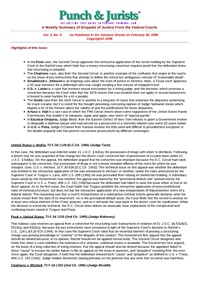Case held that the Parole Commission does not have the authority to reimpose a term of special, rather than regular parole, following revocation.
This is a rare case in which a federal prisoner wins an appeal after alleging that certain regulations of the United States Parole Commission are …
This habeas case involves an appeal from a conviction for structuring cash transactions in violation of 31 U.S.C. §§ 5324(3), 5313(a) and 5322(a), because the jury instructions were erroneous in light of the Supreme Court's decision in Ratzlaf v. U.S., 126 L.Ed.2d 615 (1994). In that case the Supreme …
In this multi-issue case, the court ruled that the Government had failed to prove that the defendant's actions substantially jeopardized the safety and soundness of the financial institution that was defrauded. Although the bank in question did become insolvent and was taken over by the RTC, and although the …
In this multi-issue appeal arising from a tax evasion conviction, the defendant unsuccessfully argued that the "tax loss" should have been limited to the value of the assets he attempted to hide from the IRS. The district court used the sum of the tax assessments against the defendant, exclusive …
Case rejevyed claims that there was any unconstitutional amendment of the indictment of bill of particulars or fatal variance between the charges and the proof at trial, explaing when such matters are and are not of concern.
Here the Court held: "When a defendant is convicted of charges …
In this case, the Sixth Circuit vacated the convictions of a state judge who was prosecuted under 18 USC § 242 for sexually assualting five women in his chambers, holding that § 242 failed to provide adequate notice that it covered sex crimes.
This decision is bound to …
This multi-issue case involves what the court calls "the financial looting of a federally insured lending institution by would-be robber barons." The appeal covers a number of issues, but one sentencing issue was whether an upward departure that the district court imposed - namely for jeopardizing the safety and …
This case raises a novel approach to a request for a downward departure, and explores an interesting interplay between the provisions of U.S.S.G. § 5H1.4 (which prohibits downward departures for drug "dependence" or "abuse"), and § 5K2.11 (which permits a downward departure where a defendant commits a crime "to …
In order to qualify for a reduction of a sentence below the mandatory minimum under the so-called "safety valve" provisions of 18 U.S.C. § 3553(f) and U.S.S.G. § 5C1.2, one of the requirements is that the defendant must have no more than one criminal history point. In this case, …
Case affirms a conviction, deespite an erroneous jury instruction re: reasonable doubt, which Judge Newman wrote, in dissent, made it "highly likely" that the jury applied the wrong definition of reasonable doubt.
This is one of those perplexing cases that causes defendants, criminal lawyers and the public to …
For a contrary view, with which this court took issue, see Rice v. U.S., 68 F.3d 702 (3rd Cir. 1995).
Here the Court held that when Congress suspended appropriations to the ATF to investigate applications for the restoration of firearms privileges to convicted felons, it did not intend …
Case affirms a conviction, deespite an erroneous jury instruction re: reasonable doubt, which Judge Newman wrote, in dissent, made it "highly likely" that the jury applied the wrong definition of reasonable doubt.
